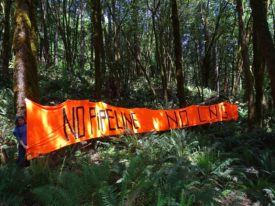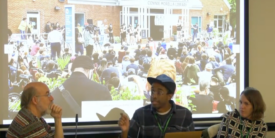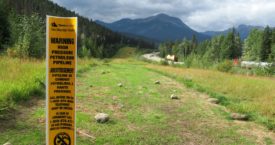Clark
Nationwide, the enforcement of marijuana laws targets minorities:
Black Americans were nearly four times as likely as whites to be arrested on charges of marijuana possession in 2010, even though the two groups used the drug at similar rates, according to new federal data.
For me, that’s another reason to applaud Washington voters for approving I-502. (Note: that’s just my opinion, not Sightline’s.)
Alan
One thing I share with Bill Gates is admiration for SVP Fast Pitch Seattle, an American-Idol like competition for young social change makers. Last year, Sightline’s former managing director Christine Hanna was one of the winners (thanks to this killer talk), for a plan to bring a local-purchasing rewards program from Portland to Seattle. The application deadline for the 2013 Cascadian edition of the annual event is approaching on July 1 (learn more here).
Eric
Danny Westneat’s column was a sad reminder of the stark division between the well-to-do white and lower-lower income black communities in Seattle’s Central District. (His reference to China Mieville’s “The City and the City” is apt. I just finished reading it, and I recommend it.)
Austin Jenkins has a revealing look at Washington State lobbyists and the legislators who love them. For example:
If there were a frequent flyer program for lawmakers who allow lobbyists to entertain them, State Senator Doug Ericksen would be racking up the miles. In the first four months of this year, lobbyists report the Republican chair of the Senate Energy Committee attended 62 meals, receptions and other lobbyist paid events with a combined, estimated value of more than $2,000. That’s more than any other Washington state lawmaker in our database and an average of one lobbyist event every other day.
Yes, that’s the same Senator Ericksen who is the primary roadblock to closing the accidental tax loophole, which would make oil refiners pay the same tax everyone else does in order to pay for public education. We know he’s eating well, but I wonder if he’s sleeping well too.
Ross Macfarlane looks at where the smart money isn’t going. (Hint: the answer rhymes with “goal.”)
Speaking of which, one senses that tempers are flaring in the Bellingham area. A new website, Communists of Whatcom County, takes aim at coal exports.
Knute Berger considers the possibility of reintroducing to the Northwest a bird that nearly killed me, the California condor. (My first sighting was while driving the winding Big Sur Coast Highway, which turns out not to be an excellent place for craning your neck upwards to make sure it’s not just another turkey vulture. Later, I got to see one gorging on a cow carcass, which was sort of evil and cool at the same time.)
The BC government is drumming its fingers with impatience. It says that its carbon tax freeze may thaw if other jurisdictions—cough, Oregon and Washington, cough—catch up.
Finally, this was just awesome: the Seattle Public Library sets a new world record for a domino chain with books. The folks who did it get major points for style.
Anna
I try to keep an open mind about these things but I’m not “there yet” when it comes to the uber-green recommendation that I add insects to my diet (and cut the more carbon-intensive proteins). But here’s a next best, and probably more broadly feasible step: Our meat should be raised on bugs.
Obama is working on getting high-quality preschool for every kid in America. But here’s how a broken political system jeopardizes the youngest Americans—especially those from low income families: “Lawmakers who labor on behalf of preschool programs may get stars in heaven, but they don’t get squat in campaign contributions. And the ones who eliminate money for infant care programs have no fear whatsoever that they’ll lose an election over it.”
Oops! Gallup is trying to explain how it blew predictions for the Romney/Obama presidential election. Four mistakes rose to the top: 1) they predicted “likely voter” turnout wrong, relying too heavily on past voting history and attention being paid to the election; 2) they neglected what turned out to be key geographical pockets of the country; 3) their questions didn’t yield an accurate picture of race and ethnicity, resulting in predictions that people of color would make up a smaller share of the vote than they did; 4) they tried to take a short-cut around random digit dialing and it didn’t work.
And is Washington’s own Thurston County figuring out how to divest from fossil fuels?
And, finally, residents of Cashmere, WA, have already had a painful preview of yet another health concern associated with climate change: toxic smoke from wildfires.









Jonathan
It’s incredible how far up the totem pole this blatant racism and discrimination goes. James Watson, who discovered the structure of DNA in the 50’s, instigated the Human Genome Project and helped identify genes implicated in autism, ADHD, OCD, Tourette’s, schizophrenia and bipolar disorder, was quoted in 2007 as saying:
“[I am] inherently gloomy about the prospect of Africa [because] all our social policies are based on the fact that their intelligence is the same as ours — whereas all the testing says not really.”
You guys may recall that several weeks ago a Harvard doctoral dissertation by Jason Richwine of the anti-immigrant Heritage Foundation was leaked and found to contain racist data from scientists all over the world. What’s truly amazing is that one of the doctoral advisors that endorsed this material, George Borjas, whose work is cited repeatedly in the dissertation, is himself a Cuban immigrant!
We often see a similar phenomenon of ideological brainwashing trickle down in places like Detroit, where the population is almost entirely black, the mayors and police chiefs have been black for several decades, and the discrimination just seems to get worse and not better.
When are people going to realize that race is just a social construct used for oppression? God created everyone equally and we’re very lucky to have courageous bloggers like Danny Westneat to challenge this ignorant scientific dogma.